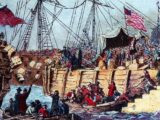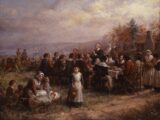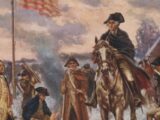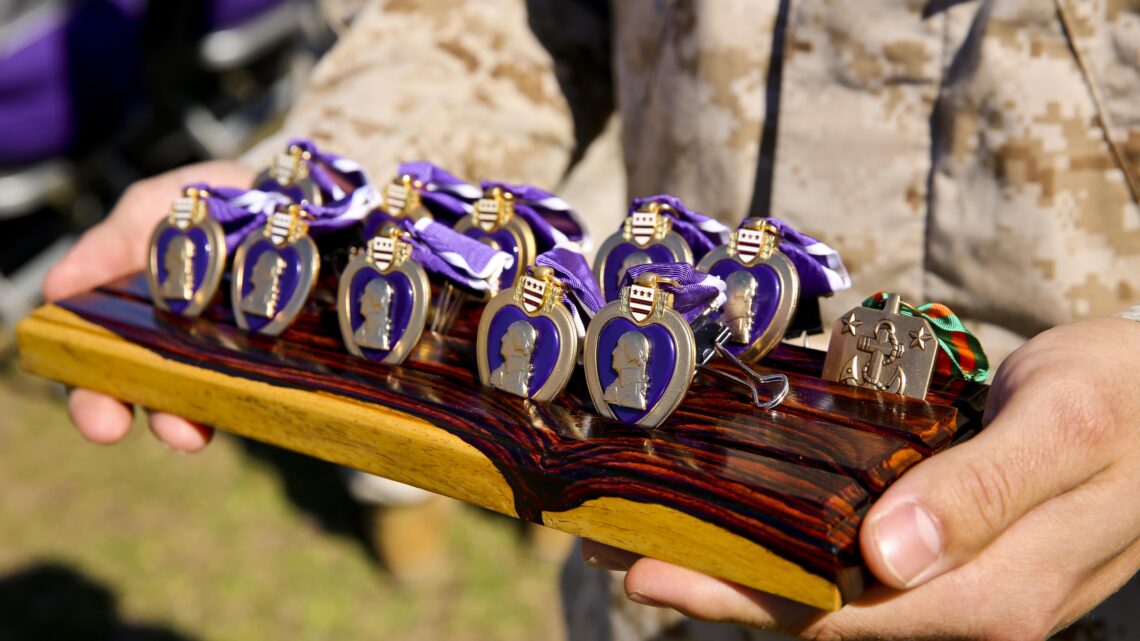
The General, ever desirous to cherish virtuous ambition in his soldiers, as well as to foster and encourage every species of military merit, directs that whenever any singularly meritorious action is performed, the author of it shall be permitted to wear on his facings over his left breast, the figure of a heart in purple cloth or silk edged with narrow lace or binding…
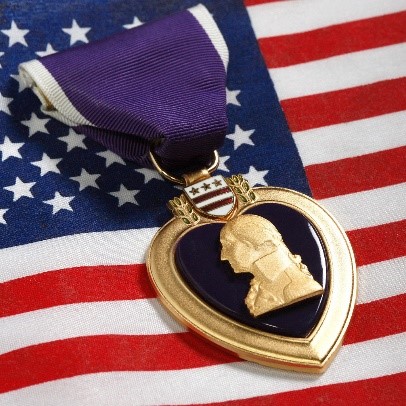
…and thus was born the oldest military honor in the United States, designed by George Washington to honor the ordinary, common soldiers. Calling it the Badge of Military Merit, this award would become today’s Purple Heart.
The medal was awarded to only three sergeants in the American Revolutionary War (William Brown, 5th Connecticut Regiment; Elijah Churchill, 2nd Regiment Light Dragoons; and Daniel Bessell, 2nd Connecticut Regiment). The original purple cloth recognized heroic action in combat and merit for performance of duties.
For 150 years, the medal was all but forgotten. Then during WWI, with the rising casualties, an organized hierarchy of valor and merit medals began to take form. Before that, only the Medal of Honor was awarded to soldiers and officers.
Congress created the Distinguished Service Cross and the Distinguished Service Medal. Then in 1932, Douglas MacArthur reintroduced the Purple Heart, to be given when wounded. In 1942, changes were made to include all branches of the services, not just the Army, and given to those who were killed in combat.
Today, no other military medal carries such a legacy and invokes stronger understanding of the price of freedom than the Purple Heart.

Audie Murphy was one of the most decorated combat soldiers of WWII. He received every military combat award for valor from the U.S. Army and France.
At 19, he received the Medal of Honor for single-handedly holding off a company of German soldiers for one hour and then mounted a counterattack even though he was wounded and out of ammunition.
Born in Texas, Audie was the great-grandson of John and his third wife Hannah Berry, early settlers of Williamson County.
THIS MONTH IN AMERICAN HISTORY
August 1, 1779 – Birthday – Star-Spangled Banner author Francis Scott Key (1779-1843) was born in Frederick County, Maryland. After witnessing the British bombardment of Fort McHenry on the night of September 13-14, 1814, he was enthralled to see the American flag still flying over the fort at daybreak. He then wrote the poem originally entitled Defense of Fort McHenry which became the U.S. National Anthem in 1931.
August 2, 1776 – In Philadelphia, most of the 55 members of the Continental Congress signed the parchment copy of the Declaration of Independence.
August 5, 1583 – The first British colony in North America was founded by Sir Humphrey Gilbert, a British navigator and explorer. He sighted the Newfoundland coast and took possession of the area around St. John’s harbor in the name of the Queen. He was later lost at sea in a storm off the Azores on his return trip to England.
August 5, 1861 – President Abraham Lincoln signed into law the first Federal income tax, a 3 percent tax on incomes over $800, as an emergency wartime measure during the Civil War. However, the tax was never actually put into effect.
August 5, 1604 – Birthday – John Eliot (1604-1690) was born in Hertfordshire, England. Known as the “Apostle to the Indians,” his translation of the Bible into an Indian tongue was the first Bible to be printed in America.
August 6-10, 1787 – The Great Debate occurred during the Constitutional Convention. Outcomes included the establishment of a four-year term of office for the President, granting Congress the right to regulate foreign trade and interstate commerce, and the appointment of a committee to prepare a final draft of the Constitution.
August 16, 1777 – During the American Revolutionary War, the Battle of Bennington, Vermont, occurred as militiamen from Vermont, aided by Massachusetts troops, wiped out a detachment of 800 German-Hessians sent by British General Burgoyne to seize horses.
August 16, 1780 – The Battle of Camden in South Carolina occurred during the American Revolutionary War. The battle was a big defeat for the Americans as forces under General Gates were defeated by troops of British General Charles Cornwallis, resulting in 900 Americans killed and 1,000 captured.
August 17, 1786 – Birthday – American frontiersman Davy Crockett (1786-1836) was born in Hawkins County, Tennessee. He was a farmer, scout and politician who perished at age 49 during the final heroic defense of the Alamo in Texas.
August 18, 1774 – Birthday – American explorer Meriwether Lewis (1774-1809) was born near Charlottesville, Virginia. Along with William Clark, he explored the American West, and in 1805, after a journey of over 18 months, reached the Pacific Ocean.
August 24-25, 1814 – During the War of 1812, Washington, D.C., was invaded by British forces that burned the Capitol, the White House and most other public buildings along with a number of private homes. The burning was in retaliation for the earlier American burning of York (Toronto).
August 29, 1632 – Birthday – British philosopher and pioneer in modern political thinking, John Locke (1632-1704) was born in Wrington, England. His ideas greatly influenced American colonists, namely that rulers derive their power only from the consent of the governed – and the doctrine that men naturally possess certain rights, the chief being life, liberty, and property.
August 31, 1786 – Shays’ Rebellion began in Massachusetts as ex-Revolutionary War Captain Daniel Shays led an armed mob. The rebellion prevented the Northampton Court from holding a session in which debtors, mostly poor ex-soldier farmers, were to be tried and likely put in prison. Following this, in September, Shays’ troops prevented Supreme Court sessions at Springfield, Massachusetts. Early in 1787, they attacked the Federal arsenal at Springfield, but were soon routed and fled. Shays was sentenced to death but was pardoned in 1788.
Calendar Courtesy of The History Place – www.historyplace.com

